Garden
Monstera Plant Care Guide – How to Plant Monsteras in Your Garden
Monstera is a genus that provides elegant houseplants.
There are more than 48 different types, and only some of them are widely available; You can grow it at home.
Monstera plant species are known for their leaf windows (holes form naturally when leaves mature).
Monsteras are called “Swiss Cheese Plants” because they have holes in their leaves, just like Swiss cheese. (Types Of Monstera)
| Genus | Monstera |
| Nickname | Swiss Cheese Plant |
| Family | Araceae / Arum |
| Known species | 48 |
| Plant Type | House plant |
| Plant Temperament | Tropical / Trailing / Vines |
| Plant Growth | Evergreen vines |
| Native | Central America (usually) |
| Fruit | Yes, in some species |
| Flowers | Spadix |
Monstera Leaf:
These plants have very different growth profiles, especially when it comes to monstera leaves. While the plant is young, no windows or holes appear in the leaves. (Types Of Monstera)
However, as the plants begin to mature, the monstera leaf also begins to grow. Holes suddenly appear in these giant leaves.
These holes continue to widen and in some varieties break the leaf margins and break a leaf into separate pieces.
This perforation is known in botanical terms as Leaf fenestration. This is the reason that makes Monsteras a Swiss Cheese Factory.
On the other hand, some leaves come without windows; they are still decorative and beautiful, like the leaves of Monstera dubia and Monstera pinnatipartite. (Types Of Monstera)
Monstera Fruit:
In all monstera cultivars, you’ll find a berry-like fruit that grows on the plant’s spadix.
As research continues, many people have different experiences with monstera fruit. (Types Of Monstera)
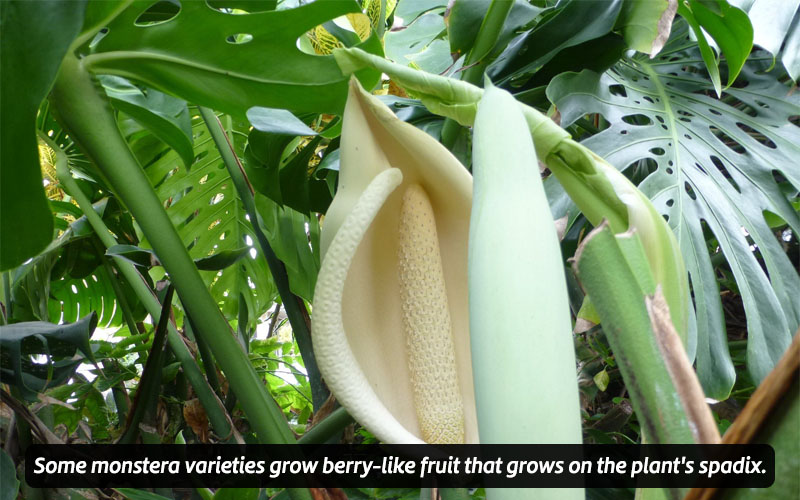
For example, some of its species produce edible and non-toxic fruits, while others have mildly toxic properties and are harmful to animals and humans. (Types Of Monstera)
Varieties such as Monstera deliciosa produce edible fruits with a salad-like flavor known as the salad fruit tree or fruit salad plant.
It has also been found that Monstera adansonii produces excellent coffee beans and hence edible fruits.
However, it is not recommended to eat the seeds or fruits of monster epipremnoids, as the plant is toxic to humans. Keep animals away from this plant as well. (Types Of Monstera)
Let’s discuss everything in detail:
All about 10 Monstera Varieties Perfect to Grow with Least Care
Monstera species query actually refers to the species of the genus Monstera or the variety of monstera.
Here you’ll find a complete guide to the different varieties of Monstera you can find at nurseries near you for home growing. (Types Of Monstera)
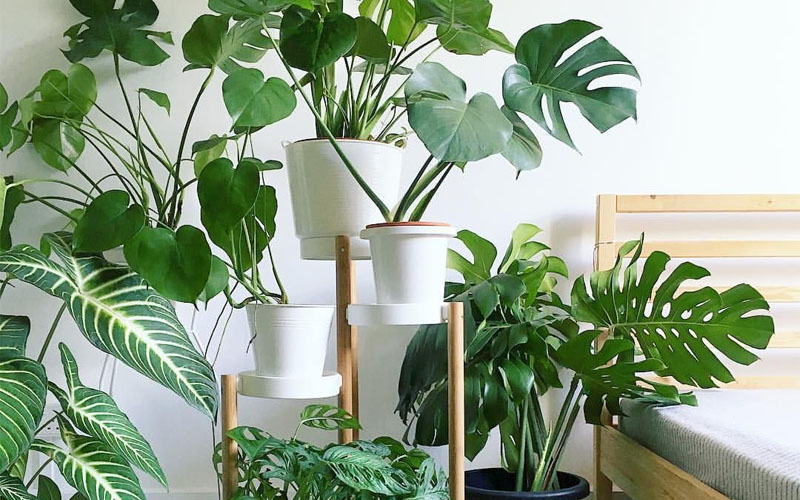
Note: The blog also includes the key to help you buy the original monstera you’re looking for so you won’t be scammed when buying different monstera plants. (Types Of Monstera)
Monstera Varieties You Can Grow At Homes:
Of the 48 Monstera plant species found, we will discuss the 10 best Monstera cultivars that you can easily grow and care for at home. (Types Of Monstera)
1. Monstera Obliqua:
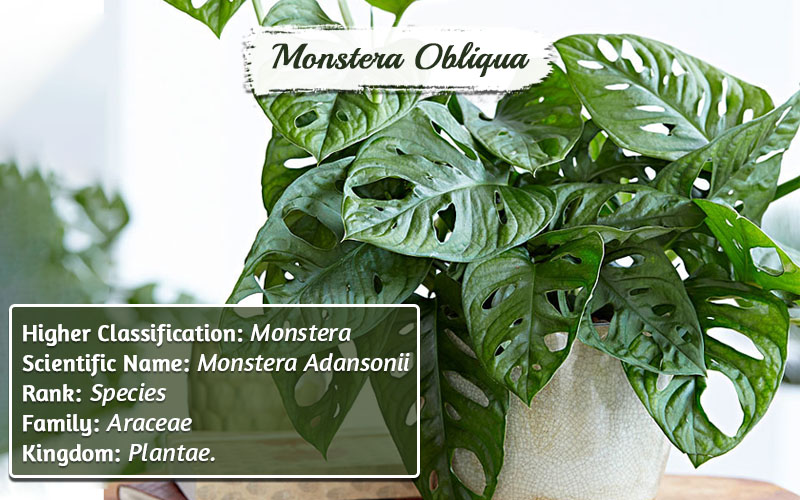
Obliqua is a rare species of the Monstera genus, but it is in great demand and plant enthusiasts continue to look for it in nurseries. (Types Of Monstera)
It is found in abundance in the Amazon basin and places such as Panama, South America, Costa Rica, Peru, Guyanas.
Obliqua is strange; You will find some varieties with beautiful windows, and some without windows at all.
Monstera Peru is the most sought after monstera plant as it has more holes than leaves, while the Bolivian type has no holes at all.
Obliqua is an easy-to-care plant with no demanding behavior. But the real challenge is to find the original obliqua. (Types Of Monstera)
Click here to find a complete guide on Monstera obliqua growth and care.
2. Monstera Adansonii:
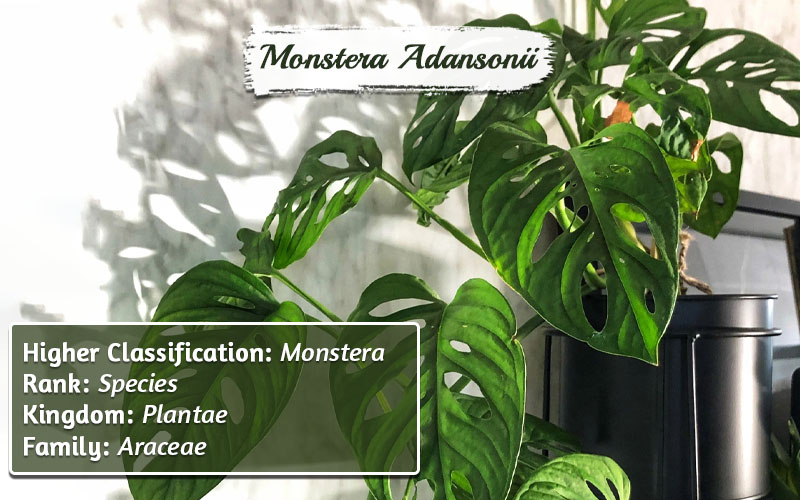
Adansonii is another beautiful windowed plant of the genus Monstera, native to Brazil, Ecuador, Peru, South America and Central America. (Types Of Monstera)
Because this Swiss cheese plant is a rare but challenging houseplant for plant lovers, it is often sold in markets as monstera obliqua.
Also known as Monstera Adansonii [adan-so-knee-eye, Monstera Friedrichsthalii [Mon-STER-uh, Free-dreech-sta-lia-na] or Swiss Cheese Vine.
This houseplant is no different from its siblings; Little water, some shade, and too much moisture will make it grow. (Types Of Monstera)
Click and learn all about monstera adansonii care.
3. Monstera Epipremnoides:
Monstera Epipremnoides is a tropical plant of the genus Monstera that requires little maintenance, aroid and effortlessly grown indoors or outdoors. (Types Of Monstera)
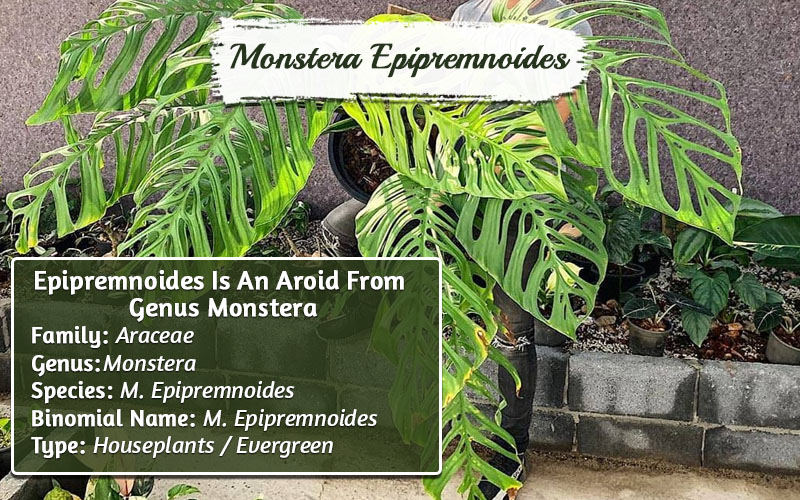
It is sometimes referred to as XL monstera epipremnoides because it reaches as large as a giant. Like the rest of Monstera plants, it has windowed leaves.
It is extremely easy and effortless to plant in houses. (Types Of Monstera)
Click the link to learn all about Monstera epipremnoides care.
4. Monstera Deliciosa:
Another Swiss cheese plant, Monstera deliciosa, is the “Top In demand” variety of monstera that grows widely in the tropical forests of southern Mexico, south to Panama. (Types Of Monstera)
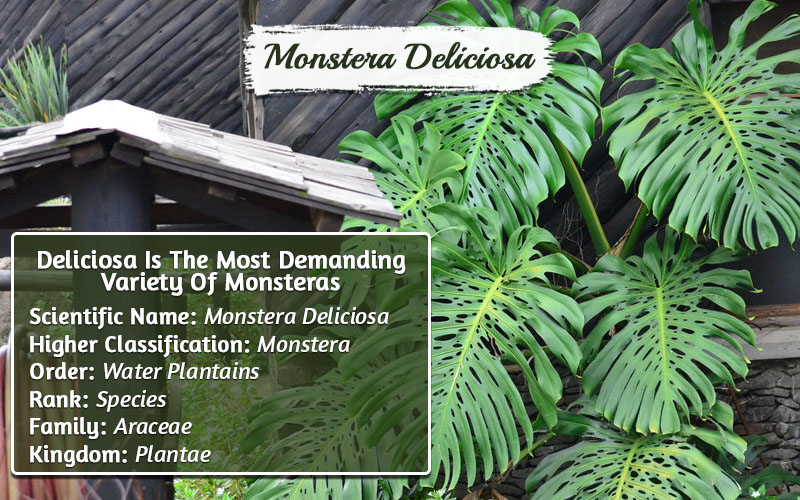
M deliciosa differs from M. obliqua because of its leaves. Although both species have windows in the leaves, still the difference is that obliqua has holes while deliciosa has split leaves. (Types Of Monstera)
What is different about Monstera deliciosa is its root system, which is not only underground, but also in the outer ground; roots begin to emerge from the trunk.
They are easy to grow, maintain and care for and make a great addition to your homes. (Types Of Monstera)
5. Mini Monstera Delisiosa:
Mini monstera is not actually a monstera, in fact the real name of the plant is Rhaphidophora tetrasperma. It belongs to a completely different genus. (Types Of Monstera)
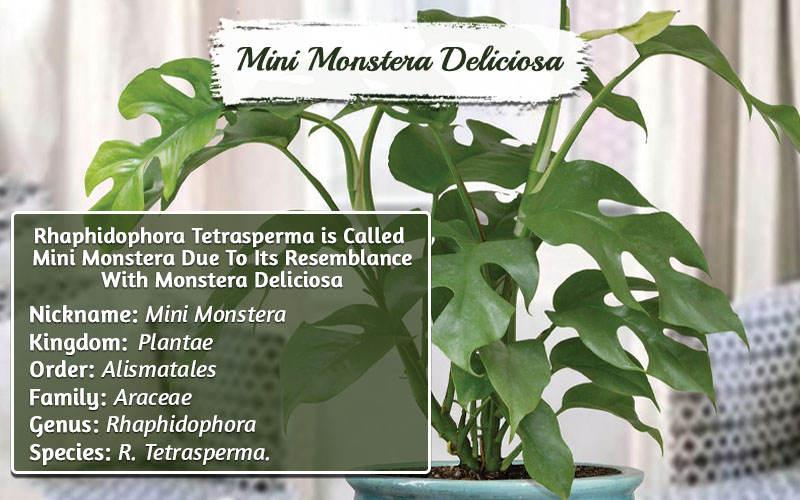
It is also an aroid; however, the genus is Rhaphidophora. The plant is called mini monstera because its leaves look exactly like Monstera Deliciosa.
You could call it the indoor version of the giant tree Monstera deliciosa. (Types Of Monstera)
Find out more about this Mini monstera Rhaphidohphora tetrasperma by clicking the link.
6. Monstera Siltepecana:
Monstera siltepecana is the rarest and most elusive species of the Swiss cheese plant genus. (Types Of Monstera)

Monstera siltepecana has no holes in the leaves, but is known for the bright silvery hue inside the leaves, more towards the middle of the veins from the edges. (Types Of Monstera)
In addition, unlike other monstera varieties, the leaves of Monstera Siltepecana are smaller, silver-colored and lanceolate glossy.
It is a rare evergreen aroid that grows like a mountaineer vine.
If you come to find this rare unicorn aroid, it will prove to be the least maintenance plant that lives very well in all areas, indoors and outdoors, with just the support provided. (Types Of Monstera)
7. Monstera dubia:
Monstera dubia has smaller leaves. It is a less common species of the genus Monstera; however, it can be an excellent addition to your homes thanks to its low maintenance quality.
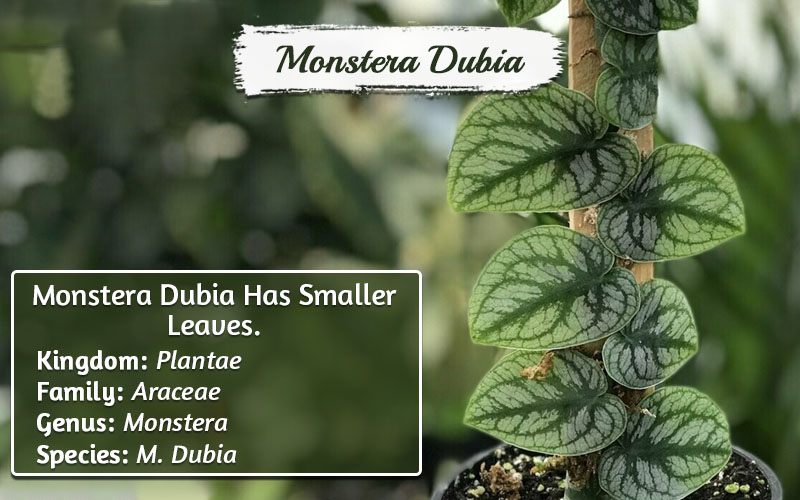
Monstera dubia does not have perforated leaves, but, like its sister Monstera siltepecana, has decorative leaves with dark and bright green stripes inside.
They grow like climbers from the seed stage to the forest floor and are native to Central and South America.
This easy-care monstera variety could be the perfect thing to add to your home.
8. Monstera standleyana:
Monstera standleyana differs from its sister monstera member plants in that it is a relatively slow grower. But this does not mean that it is difficult to develop and care for plants.
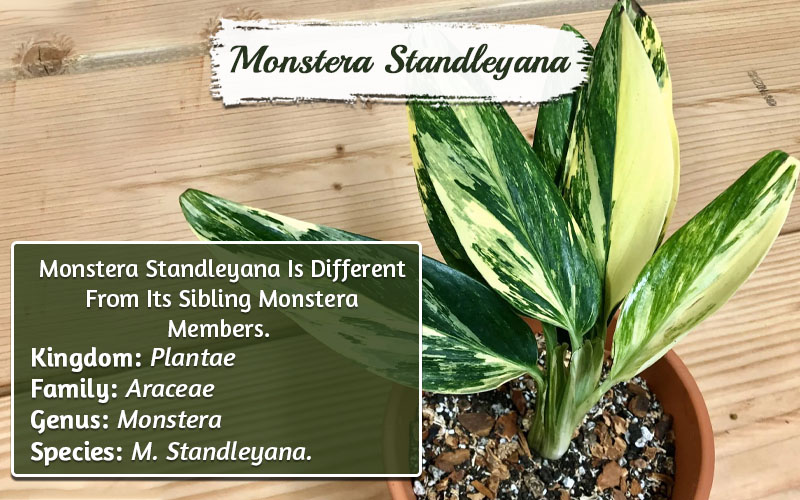
Monstera standleyana can be grown indoors to outdoors in any location for its lush appearance and decorative foliage.
One thing you need to consider is temperature and Monstera standleyana care while growing. They like mild temperatures, while they may show tantrums when conditions deteriorate.
The rest of Monstera Monstera standleyana is easy to care for.
9. Monstera Pinnatipartita:
Monstera Pinnatipartita, or the five-hole plant, is another beautiful species from the aroid family.
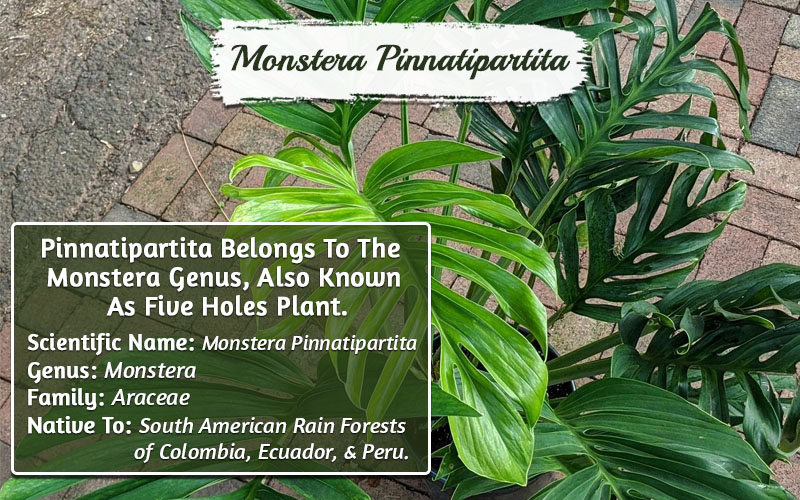
Although most monsteras can only be distinguished by mature leaves, you can easily identify Pinnatipartita even when the leaves are young.
How? with a combination of holes and variegated leaves. Yes, you will get leaves with bleached edges or a bright spray of light green tones.
The charming climber will sit very well on balconies or near your tree trunks.
When it comes to Monstera Pinnatipartita care, it’s not that difficult.
As with any other plant, all you need to do is find a well-draining and breathable soil, as excess water at the bottom can cause root rot.
10. Monstera Variegata
Monstera Variegata is not a single species of monstera genus, but a cultivar from which several monstera plants come.
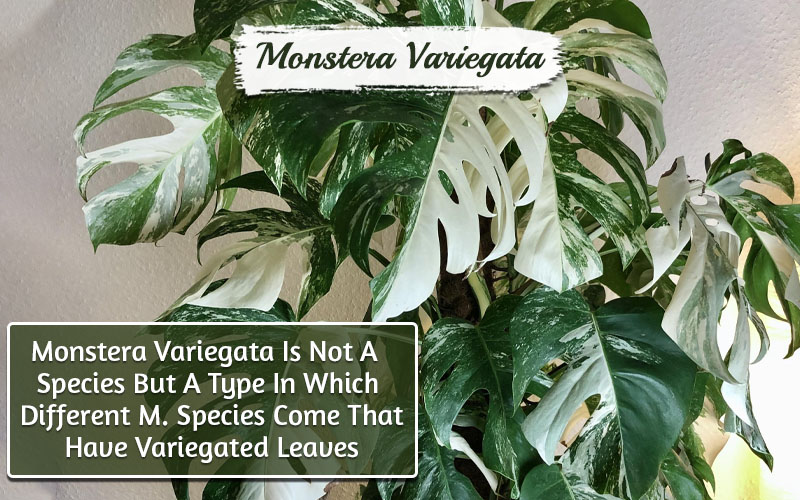
All monsteras with variegated leaves appear in this variety. Due to the lack of chlorophyll in Monstera leaves, they often begin to lack their original lush green color.
Sometimes the condition does not cause any harm to the overall health of your monstera plants; however, in rare cases, this discoloration may occur due to a fungal infection in your plant.
In this case, you will need to take immediate action against insects or microbes that cause fungus on the leaves of your plant.
Varieties of Monstera Care:
Caring for your Monstera plant is not as difficult as it may seem; It offers the most effortless care for monstera plants.
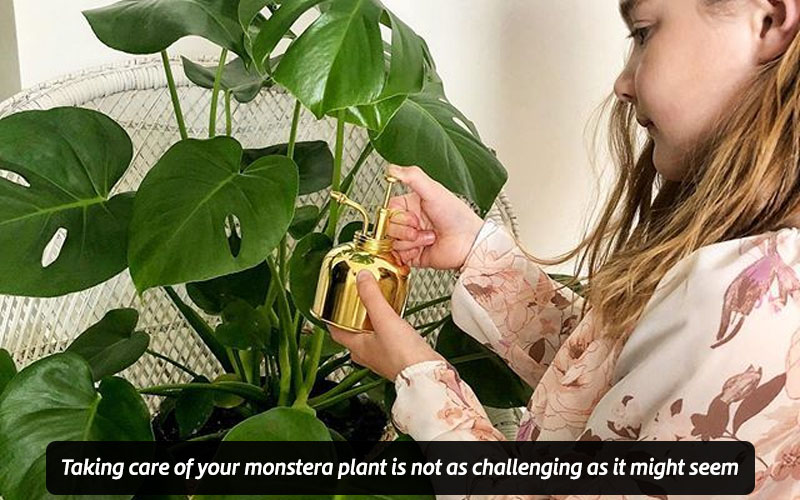
Remember, monstera care varies with each plant; Here we discuss only some general points.
· Placement:
Monsteras grow very large; so find ample space when placing your plant. Indoors can grow up to 3 feet tall and outdoor spaces can get larger than that; 20 meters.
· Watering:
Monstera plants are not like the genus Selaginella, where different cultivars have different irrigation needs. In this, all species require moderate watering once a week.
· Humidity:
As climbers and houseplants, all Monsteras love moisture. The moisture helps them grow, stay happier, and keep bugs away from them.
· Soil:
Monstera plants love well-drained potting mix soil. They hate sagging, and in such cases their roots can rot. But the humidity on the ground must remain constant.
· Fertilizers:
Monstera plants are very independent and hate over-fertilization. You will only provide your plant with nutrients during the growing season. Be sure to use only organic and well-fed fertilizers.
Bottom Line:
If you’re interested in rare but easy-to-grow plants at home, our blog is full of that stuff. You will get real information about plants and animals. Bookmark it so you don’t miss any posts.
If you like our work, please leave a comment and share our guides with your friends.
Also, don’t forget to pin/bookmark and visit our blog for more interesting but original information.